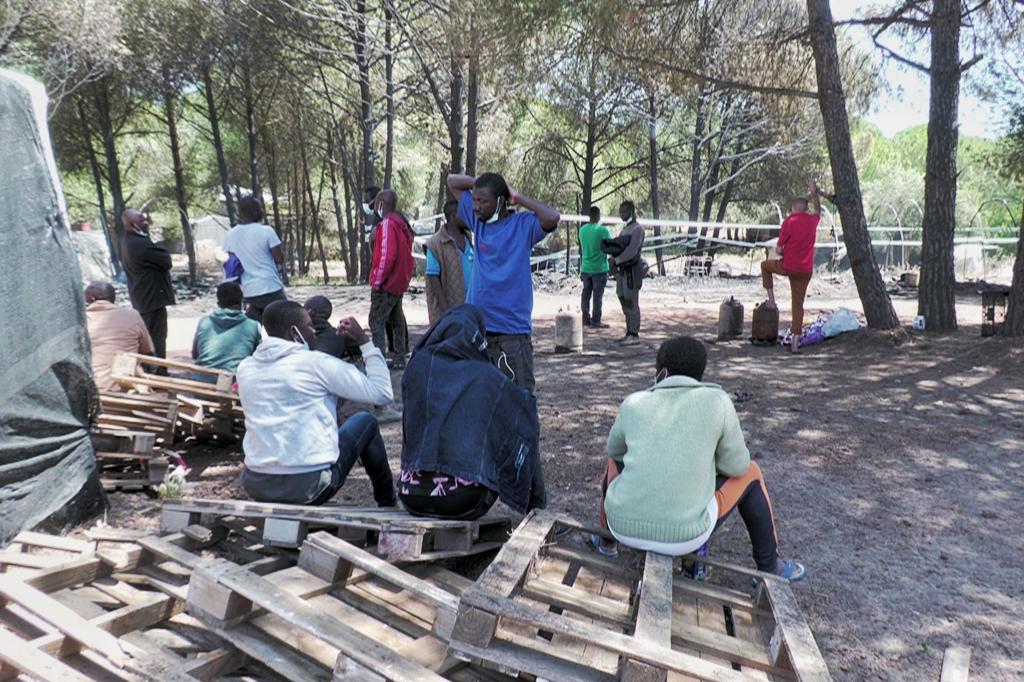Events A fire leaves two dead in a shanty town of immigrants in Huelva
Immigration X-ray of misery in the shadow of 'red gold': the twelve shanty towns of Lepe in the crosshairs of the UN and the EU
Ato was 44 years old and had been living in the wood and plastic shack for almost a decade in which the fire broke out at midnight and destroyed part
of the El Bosque settlement
in Lucena del Puerto (Huelva). No trace remained of his shack, but the worst thing is that the fire claimed his own life and that of the Moroccan woman he had been dating for a few months. Her name was Essadia and she was in her early 30s.
Their deaths make the umpteenth incident in the shanty towns of Huelva the most serious of those that have taken place lately and put on the table, once again, the situation in which thousands of people live not only in the province of Huelva, but also in Almería. In total, some
13,000 immigrants
who live poorly in the more than one hundred camps that are distributed to both ends of Andalusia.
Just two days ago, another settlement in Palos de la Frontera burned, leaving the nearly 200 people who were sheltering in their slums even more on the street and causing minor injuries and the occasional anxiety crisis to seven of them.
And last February, the fire also made its own in Palos but in another of the camps that are distributed around the strawberry, raspberry and blueberry plantations in which many of them make a living
outside the legality
, since the vast majority do not have papers.
The succession of fires yesterday stopped in El Bosque, in Lucena, it is not a novelty this year either.
The fires are relatively
frequent
and two years ago they registered as many as 16.
The most striking thing is that Ato did not have a
kitchen
in his shack, but the fire started in its fragile structure and from there it quickly spread to all those who were in the vicinity.
More than a shack, Ato's was, recalls Raúl Sánchez, head of settlements at the Huelva Red Cross, like a
social center
where the inhabitants of the settlement met, had a beer - it also functioned as a bar - and Above all, they found support and help.
Because this Ghanaian had become, by seniority and by his own merits, a kind of "mayor" in whom "everyone trusted."
Raúl knew him well.
They had been treated for years and it was he who accompanied Ato to his medical visits.
This Wednesday, only a few hours after the tragedy, he reminded him and emphasized that he was "very good people", that he was always "helping others", especially those who came
new
, who found him, said the technician of Red Cross, someone who listened to them and guided them.
Some of the inhabitants of the settlement contemplate the shacks destroyed by the flames.
It was Raúl's phone number that was dialed first by the inhabitants of the settlement when the flames began to rise in the night.
That happened around two thirty in the morning and he was the one who called 112.
When, after a few hours, he reached the camp, he saw only
desolation
.
That of the Ato and Essadia shacks and the others that burned and that of those who have been left with nothing, even without the most basic documentation.
The Red Cross brought them some food, clothing, blankets and, explained Raúl, now they will begin to help them with the procedures to renew the
documentation
.
Little is known about the causes of the fire.
The Civil Guard has opened an investigation and the
hypotheses
, according to sources from the armed institute, right now are all imaginable.
Without ruling out any.
Although most of the
sister fires
of Lucena, at least until now, have been due to carelessness or accidents, says this Red Cross worker.
Then there is the question of the terrible conditions of the shacks, made of highly
flammable
materials
, mainly plastics and wood, which act as fuel when a flame approaches.
In the El Bosque settlement, as in all the others, there is
neither water nor electricity
.
They cook with gas, light up with fire - some have a generator or a couple of solar panels to power some light bulbs - and store water in thousand-liter jugs to wash or clean themselves.
"It's the same as always," laments Javier Pérez, from the NGO Cepaim, who knows the terrain very well and who has spent practically all his life helping to improve the living conditions of the immigrant community.
Pérez puts his finger on the wound and demands that, "once and for all", the administrations, businessmen and social entities get to work "seriously" to find a
solution
to the problem of shanty towns.
It cannot be, he criticizes, that in a country like Spain and in the 21st century we have "refugee camps," he says, recalling the words of the UN rapporteur who visited the Lepe camps.
"They are people who want to fulfill a dream," he adds.
According to the criteria of The Trust Project
Know more
Huelva
Almeria
Andalusia
Civil Guard
Spain
theater
De-escalation More road checks on the first weekend of mobility between provinces
SocietyA Galician tetraplegic makes the first public request for medicinal cannabis self-cultivation
Innovation is born 1,070 KM HUB, the largest alliance of innovation ecosystems in Spain
See links of interest
Holidays 2021
Holidays Andalucia
Home THE WORLD TODAY
Stage 11 of the Giro: Perugia - Montalcino

